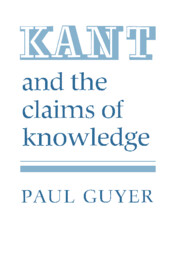Book contents
- Frontmatter
- Contents
- Acknowledgments
- Note on sources
- Introduction
- Part I Kant's early view
- 1 The problem of objective validity
- 2 The transcendental theory of experience: 1774–1775
- Part II The transcendental deduction from 1781 to 1787
- Part III The principles of empirical knowledge
- Part IV The refutation of idealism
- Part V Transcendental idealism
- Afterword
- Notes
- Index of passages cited
- General index
2 - The transcendental theory of experience: 1774–1775
Published online by Cambridge University Press: 09 March 2010
- Frontmatter
- Contents
- Acknowledgments
- Note on sources
- Introduction
- Part I Kant's early view
- 1 The problem of objective validity
- 2 The transcendental theory of experience: 1774–1775
- Part II The transcendental deduction from 1781 to 1787
- Part III The principles of empirical knowledge
- Part IV The refutation of idealism
- Part V Transcendental idealism
- Afterword
- Notes
- Index of passages cited
- General index
Summary
Little more than three years after his famous letter to Marcus Herz, a great deal of Kant's eventual solution to the problem of the a priori but objective validity of the categories was already in place. These three years must have been a period of intense thought, but little of what Kant may have written during them has survived. Fortunately, however, some evidence of Kant's ideas at this point is preserved for us in a number of fascinating fragments. Several of these are marginalia in a copy of Baumgarten's Metaphysica which Kant used for many years, beginning in 1767. (For that reason the marginalia have been dated only loosely.) But the bulk of them are a set of closely related separate sheets (so-called lose Blätter) known as the Duisburg Nachlass, which have been assigned to the years 1774 and 1775 with some certainty. These documents provide fundamental insight into both the strategies and the problems of the eventual Critique by virtue of both their similarities to and their differences from the published work and are revealing in what they leave obscure as well as in what they make clear. They furnish indispensable evidence for the objectives and assumptions underlying the Critique of Pure Reason.
These materials suggest the following conclusions. The fundamental idea of 1774–5 is that certain rules can be shown to be necessary conditions for thinking of objects, as opposed to merely having sensations. But there is an underlying ambivalence on Kant's part as to how these rules are to be derived which is never really resolved, even in the Critique of 1781.
- Type
- Chapter
- Information
- Kant and the Claims of Knowledge , pp. 25 - 70Publisher: Cambridge University PressPrint publication year: 1987



